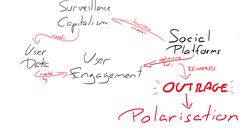Relevant Overviews
- Communication Strategy
- Content Strategy
- Online Strategy
- Online Community Management
- Social Media Strategy
- Content Creation & Marketing
- Online Architecture
- Digital Transformation
- Thinking tools
- Zettelkasten
- Fediverse
- Innovation Strategy
- Surveillance Capitalism, Social media and Polarisation (Overview)
- Communications Tactics
- Psychology
- Social Web
- Media
- Politics
- Communications Strategy
- Science&Technology
- Business
Overview: Online Community Management
Convening a community can be the most powerful communication tactic there is.
Online communities offer enormous opportunities to the right organisation. Community members are far more likely to read your content, think of your organisation, give you feedback, share your content, attend your events, get involved in your programmes, and buy your products.
On the other hand, convening a community is hard: few people have time for more than a couple of online platforms in their lives, so attracting them to yours means you need to be uniquely useful to them.
That generally requires a change of mindset and new internal processes across the organisation, because it’s not your community - it's theirs. And getting their involvement means really listening to what they have to say, and then visibly acting on it.
I built the EU Commission’s first online community in 2002, and have built many more successful ones since. If you’d like to chat, get in touch.
More services: start with Communication strategy.
Relevant resources

For the 6th episode of his Futurized podcast, Trond Undheim asked me why surveillance capitalism inevitably leads to polarised, undemocratic and dysfunctional societies, and what we must do about it...If we don’t change course, in the future we will be less will informed, more polarised, massively manipulated, living in more corrupt and less democ…
Watching Silicon Valley exercise news judgment has been like watching Walter Cronkite try to write code in Python... Four companies have created trustworthiness indicators for news websites: Facebook, Google, Twitter, and NewsGuard. Publishers have no way of learning their secret trust score from the Silicon Valley companies. NewsGuard’s journalis…

In the US, radio began as a free-market free-for-all. More than five hundred radio stations sprang up in less than a decade to explore the possibilities... 40 percent were noncommercial... network of interlinked stations playing local and national content supported by local and national advertising, became dominant players...Soviet Union... ideolo…

Most criticisms lodged against the content creators that chose to work with the platforms are made with the benefit of hindsight... the decision many publishers made to close down their comment sections should be considered one of the industry’s worst blunders.... editors looked down into their article comments sections and did not like what they …
Even in a world where people increasingly get news from social media, the professional news media is still seen as largely to blame for low trust... Reuters Institute for the Study of Journalism examines the underlying reasons for trust and distrust ...Bias, spin and hidden agendas come across as the main reasons...perceived decline in journalisti…

Every time you open your phone or your computer, your brain is walking onto a battleground... Your captive attention is worth billions ... This has actually changed how you see the world... walls of code have turned you into a predictable asset — a user that can be mined for attention... by focusing on one over-simplified metric, one that suppor…

"Internet subcultures take advantage of the current media ecosystem to manipulate news frames, set agendas, and propagate ideas..." plus a lot more: it's a 100+page report

the Internet now seems to be on constant boil... extremists of all stripes are ascendant, and just about everywhere you look, much of the Internet is terrible...social networks seem to be feeding a cycle of action and reaction. In just about every news event, the Internet’s reaction to the situation becomes a follow-on part of the story, so that …
If you care about EU democracy you need to care about European media, particularly as the upcoming US media invasion gets underway. They'll be pushing on an open door when they get to Brussels.
As I mentioned in my previous post, the past couple of years have seen a lot of innovation in online content strategy, coupled with growing disenchantment with "Big Internet".

There are more good recommendations in here than can be summarised, but if I had to choose one, it's: "Integrate the developers and editors, from where they sit to whom they report to. If you’re going to do social journalism well, you’re becoming a technology platform company... Almost all the important breakthroughs in social media have come fro…
Original linkTonight I'll be toddling along to Grilling Kippers, a UKIP-focused anti-Eurosceptic campaign from deep within the Brussels Bubble.
At last, an opportunity to blog about gardening and EU comms in the same post.
On November 8, MEPs will discuss '10 concrete political proposals' for creating the European public sphere via digital media, developed by IHECS (Institut des Hautes Etudes des Communications Sociales) and their partners via Socialeuropeanjournalism.com.
Next week will see yet another physical meeting in Brussels dedicated to exploring the European public space, an irony which appears permanently lost to the organisers of the neverending stream of conferences, seminars and workshops which can be only attended by Brussels Bubble Insiders, and have neither webstreaming nor any online community (Euro…
Relevant Overviews
- Communication Strategy
- Content Strategy
- Online Strategy
- Online Community Management
- Social Media Strategy
- Content Creation & Marketing
- Online Architecture
- Digital Transformation
- Thinking tools
- Zettelkasten
- Fediverse
- Innovation Strategy
- Surveillance Capitalism, Social media and Polarisation (Overview)
- Communications Tactics
- Psychology
- Social Web
- Media
- Politics
- Communications Strategy
- Science&Technology
- Business